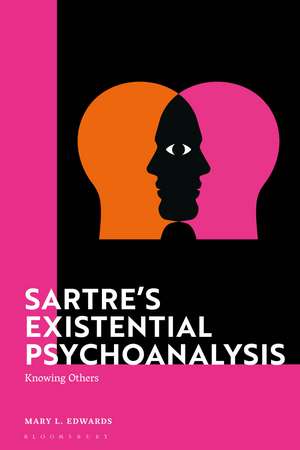Sartre’s Existential Psychoanalysis: Knowing Others
Autor Dr Mary Edwardsen Limba Engleză Paperback – 29 mai 2024
| Toate formatele și edițiile | Preț | Express |
|---|---|---|
| Paperback (1) | 192.30 lei 6-8 săpt. | |
| Bloomsbury Publishing – 29 mai 2024 | 192.30 lei 6-8 săpt. | |
| Hardback (1) | 540.54 lei 6-8 săpt. | |
| Bloomsbury Publishing – 16 noi 2022 | 540.54 lei 6-8 săpt. |
Preț: 192.30 lei
Nou
Puncte Express: 288
Preț estimativ în valută:
36.80€ • 38.02$ • 30.63£
36.80€ • 38.02$ • 30.63£
Carte tipărită la comandă
Livrare economică 25 martie-08 aprilie
Preluare comenzi: 021 569.72.76
Specificații
ISBN-13: 9781350331075
ISBN-10: 1350331074
Pagini: 272
Ilustrații: 2 bw illus
Dimensiuni: 156 x 234 x 25 mm
Greutate: 0.39 kg
Editura: Bloomsbury Publishing
Colecția Bloomsbury Academic
Locul publicării:London, United Kingdom
ISBN-10: 1350331074
Pagini: 272
Ilustrații: 2 bw illus
Dimensiuni: 156 x 234 x 25 mm
Greutate: 0.39 kg
Editura: Bloomsbury Publishing
Colecția Bloomsbury Academic
Locul publicării:London, United Kingdom
Caracteristici
Provides a means of interpreting Sartre's oeuvre and career in a coherent way, by integrating his existential psychoanalysis into his overarching philosophical project
Notă biografică
Mary L. Edwards is Lecturer in Philosophy at Cardiff University, UK.
Cuprins
1. Sartre's Theory of the Self2. Knowledge of Selves3. Situated Selves: The Development of Sartre's Existential Psychoanalysis4. The Family Idiot and the Objectification of a Self5. Objectivity in Sartre's Study of Flaubert6. Imagining the Selves of Others7. The Future of Sartrean Existential Psychoanalysis
Recenzii
This book is of great importance to both Sartre Studies and the wider question of how we can know and understand others. It shows, in an utterly compelling and innovative way, how Sartre's engagement with psychoanalysis is interwoven with his philosophical work. The insights of the earlier discussions on existential psychoanalysis are interwoven with the discussion of dialectics in the Critique of Dialectical Reason and shown to be exemplified in the neglected late work on Flaubert, L'idiot de la famille. Consequently, the intersecting discussions throughout Sartre's oeuvre on the possibility of understanding others, the relation between the subjective and the objective, the role of empathy, and the relation between the real and the imaginary, are made explicit. Focusing on the psychoanalytic thread in Sartre's work, it is essential reading for those interested in Sartre, but also more widely for those engaged with the question of our relation to others.
